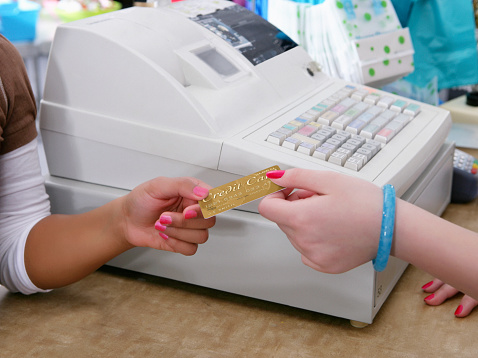Should You Open A Custodial Account For Your Kid?
Share the post
Share this link via
Or copy link

Source: andresr / Getty
My parents opened a custodial account for me when I was a little girl. They didn’t put much in it at the time, but it grew so much that I’m about to use it for a very important purchase. For those who aren’t familiar with custodial accounts, they are savings accounts you open for a minor that legally belong to said minor, but are supervised (and often contributed to) by the adult who opened it until said minor becomes 18 years old. So my parents were never allowed to take money from my custodial account for their own use (more on that later). They could put money in there—to see it earn and grow, so I could use it one day—but they could not take money out for any personal use because, legally, that money was mine.
Now don’t worry about creating a hefty account for an 11-year-old: she can’t touch it either. The minor whose name is on the account cannot just grab it any time she wants to buy toys or a new car. That being said, the custodian (presumably you, the parent) is allowed to use the money in there for things that directly benefit the child, such as prep school tuition or a second language tutor. Later, the money will fall under the control of the child when she turns some age between 18 and 21, depending on in which state you live.
The only other control the custodian has—other than using the assets in the account to fund things that directly benefit the child—is to move the assets from, say, a stock to a bond, or some new avenue for earnings. It’s kind of a great concept, don’t you think? I didn’t even know I had such an account until I turned 18, and when I discovered it, I was truly touched. Wow: that was something my parents did, to secure my future, that has had a huge impact on me. Here are reasons you should start a custodial account for your kid, and what to know about them.

Source: SDI Productions / Getty
There are two kinds; here’s type 1
Love MadameNoire? Get more! Join the MadameNoire Newsletter
We care about your data. See our privacy policy.
There is not just one type of custodial account, so it’s good to familiarize yourself with your options, to choose the best one for your goals and financial situation. One type of custodial account is called a Coverdell ESA. The money in this account is to be used solely for educational purposes, there is a limit on what you contribute each year ($2,000), and it is only available to families who fall under a certain income level. Luckily, the taxes on interested earned in this account are deferred and any withdrawals made for educational purposes will not be taxed.

Source: davidf / Getty
Here’s type 2
Next there is the Uniform Transfer to Minors Act account or the UTMA. It offers a simple way to transfer funds to a minor without creating a trust, you can contribute up to $15,000 a year (or $30,000 for couples giving separate gifts), and there are no restrictions regarding income level. The funds from this account must be used explicitly for the benefit of the minor, but aren’t limited to strictly education needs, as they are in the Coverdell ESA.

Source: PeopleImages / Getty
Here’s type 3
There is also the Uniform Gift to Minors Act account or UGMA account. This one offers lots of flexibility, as, in addition to transferring funds, you can transfer savings bonds, stocks, annuities, and life insurance. These funds must also be used explicitly for the benefit of the child, and breaking that rule can lead to serious legal consequences.

Source: wera Rodsawang / Getty
You won’t accidentally spend it
The beauty of a custodial account is that, if you put that amount in there each year—let’s say it’s $2,500—you know you won’t spend it on anything frivolous or questionable. It’s safe from your child’s demands of that very expensive toy or designer clothes. You know that your child may pressure you into buying her useless and depreciating gifts over the years. It’s nice to know that at least your annual contributions to the account are safe from that spending.

Source: Steven Puetzer / Getty
They won’t accidentally spend it
Many parents don’t opt for a custodial account because they give their children a monthly allowance, and they encourage their children to save that money. Here’s the thing: your child’s allowance will not earn interest, and she may blow it on movies and meals. If you worry that creating a custodial account doesn’t offer that hands-on education about money management that an allowance does, you can still sit down and talk to your kids about spending habits.

Source: skynesher / Getty
It can help with college
For couples who have no idea how they’ll fund their child’s college education one day, starting a custodial account early is a great idea. While there are scholarships and other aid available, it may be not be the best idea to count on those to get your kid through college—especially since they may not cover everything. And remember that there are always surprise costs associated with college, like books, food, rent, a parking spot on campus, and so much more.

Source: FatCamera / Getty
It can affect financial aid later
You should know that having a custodial account can affect the financial aid your child receives for college later. When considering how much aid to give a child, lending and charitable institutions consider how many assets the child already has, and the funds in her custodial account will be counted as her assets. This shouldn’t deter you from starting such an account, but it’s important to know.

Source: andresr / Getty
It can help with home down payments
In my case, the funds from my custodial account are helping my partner and I purchase our first home. My father, being a smart money man, decided to borrow money for my college education rather than use my custodial funds because he was able to borrow money at a lower rate than the funds were earning interest. So, in other words, he was actually able to still come out on top by borrowing the money for school. My student loans came at an interest rate of around three percent but my custodial fund were earning interest at just shy of six percent. See the difference? Now I’m using those funds that continued to grow to purchase a home.

Source: JGI/Jamie Grill / Getty
They don’t have to claim it at 18
Your child also doesn’t have to take over the money at age 18. Legally, she can, but if you have an open dialogue about money, you can do what my father did: he said, “This money is yours now if you want it or, if you’d like, I can continue to manage it for you, finding investment opportunities for it, and growing it.” Your child may say no to that arrangement, but it’s worth discussing.

Source: LumiNola / Getty
They can use the interest to pay bills
Should you go with the plan we just discussed—which I, personally, did—your child can use the interest her principal is earning to cover bills. I know that helped me quite a bit when I’d just graduated college and was facing funding my whole life for the first time. I was earning interest of about $350 a month from my custodial account, using that to pay for my car and phone bill, and not touching the principal.

Source: andresr / Getty
It doesn’t have to cost you much
You can really just put a grand or two a year in the custodial account. If you start that early, it can seriously pay off for your child when she becomes an adult. And, know that the minor can also make her own contributions—so if she gets a summer or after-school job, she’s welcome to contribute some of that to the account. You can also receive gifts from generous relatives to the account—in case they’re wondering what to get the child for her birthday.

Source: kali9 / Getty
It means so much to them
I was honestly floored when my parents told me about the account. Really. I was speechless, and then I cried. Knowing that they made a point to go to a brokerage firm and open this account, and then, every year, to tuck away money to put into my account, and to manage and supervise how it was invested, all so I could have this cushion, was an incredible discovery. It’s a cool thing to do for your kids. Cool doesn’t even begin to describe it.

Source: DjelicS / Getty
Your kids will still be taxed
There are specific rules regarding taxes in these sorts of accounts, and they vary depending on how much is earned and what type of account you open. But know that they are not tax-free. Your child will most likely see a small tax break or a “kiddie tax” since she is a minor, and the interest is considered “unearned income” as she isn’t accessing it or spending it.

Source: Romix Chang / EyeEm / Getty
So it’s not a tax shelter
It’s important to cover this tax issue as many parents make the mistake of trying to use the custodial account as a tax shelter, ushering tens of thousands in each year (intended for things like college education), and expecting to get off the hook for paying taxes on it. That is not the case, and you don’t want be surprised by a big bill from the IRS regarding this type of account.

Source: FatCamera / Getty
Not all adults are grown up
It’s always important to consider, when opening this type of account, that around age 18 or 21, your child will be legally responsible for the money. And, as we know, very few individuals of that age are actually responsible or knowledgeable enough to make good choices with large sums of money. So, if you do open this account, make sure to start talking to your child early about being responsible with money, and make sure she understands how important it is to take good care of that money, once it becomes hers. You didn’t invest it for her all so she could blow it on a cruise.
-

Meet Dominique Fils-Aimé, The Haitian-Canadian Star Redefining Jazz For A New Generation: ‘This is My Vision' [Exclusive]
-

Cooking With Purpose — How Brittney Williams Honors Her Caribbean Roots Through Food
-

Bucket Baddies With Big Energy — The 30 Hottest NBA Players In The Game Right Now
-

8 Famous Lesbian Women Who Were Married To Men



